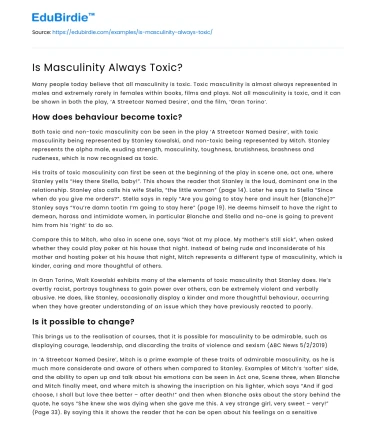Many people today believe that all masculinity is toxic. Toxic masculinity is almost always represented in males and extremely rarely in females within books, films and plays. Not all masculinity is toxic, and it can be shown in both the play, ‘A Streetcar Named Desire’, and the film, ‘Gran Torino’.
How does behaviour become toxic?
Both toxic and non-toxic masculinity can be seen in the play ‘A Streetcar Named Desire’, with toxic masculinity being represented by Stanley Kowalski, and non-toxic being represented by Mitch. Stanley represents the alpha male, exuding strength, masculinity, toughness, brutishness, brashness and rudeness, which is now recognised as toxic.
Save your time!
We can take care of your essay
- Proper editing and formatting
- Free revision, title page, and bibliography
- Flexible prices and money-back guarantee
His traits of toxic masculinity can first be seen at the beginning of the play in scene one, act one, where Stanley yells “Hey there Stella, baby!”. This shows the reader that Stanley is the loud, dominant one in the relationship. Stanley also calls his wife Stella, “the little woman” (page 14). Later he says to Stella “Since when do you give me orders?”. Stella says in reply “Are you going to stay here and insult her (Blanche)?” Stanley says “You’re damn tootin I’m going to stay here” (page 19). He deems himself to have the right to demean, harass and intimidate women, in particular Blanche and Stella and no-one is going to prevent him from his ‘right’ to do so.
Compare this to Mitch, who also in scene one, says “Not at my place. My mother’s still sick”, when asked whether they could play poker at his house that night. Instead of being rude and inconsiderate of his mother and hosting poker at his house that night, Mitch represents a different type of masculinity, which is kinder, caring and more thoughtful of others.
In Gran Torino, Walt Kowalski exhibits many of the elements of toxic masculinity that Stanley does. He’s overtly racist, portrays toughness to gain power over others, can be extremely violent and verbally abusive. He does, like Stanley, occasionally display a kinder and more thoughtful behaviour, occurring when they have greater understanding of an issue which they have previously reacted to poorly.
Is it possible to change?
This brings us to the realisation of courses, that it is possible for masculinity to be admirable, such as displaying courage, leadership, and discarding the traits of violence and sexism (ABC News 5/2/2019)
In ‘A Streetcar Named Desire’, Mitch is a prime example of these traits of admirable masculinity, as he is much more considerate and aware of others when compared to Stanley. Examples of Mitch’s ‘softer’ side, and the ability to open up and talk about his emotions can be seen in Act one, Scene three, when Blanche and Mitch finally meet, and where mitch is showing the inscription on his lighter, which says “And if god choose, I shall but love thee better – after death!” and then when Blanche asks about the story behind the quote, he says “She knew she was dying when she gave me this. A vey strange girl, very sweet – very!” (Page 33). By saying this it shows the reader that he can be open about his feelings on a sensitive topic.
In ‘Gran Torino’, Thao, while much different from Mitch, still holds many traits of admirable and masculinity. Thao started out as insecure and timid, but began to become more confident, persistent and more of a leader. These traits became more and more refined once Thao began to work for Walt, who ordered him around, giving him jobs to do such as fix the house across the road and gardening.






 Stuck on your essay?
Stuck on your essay?

